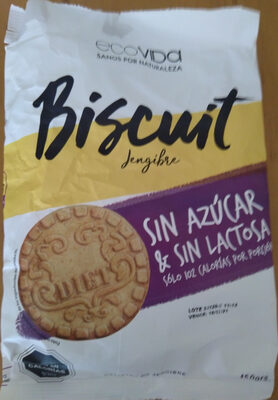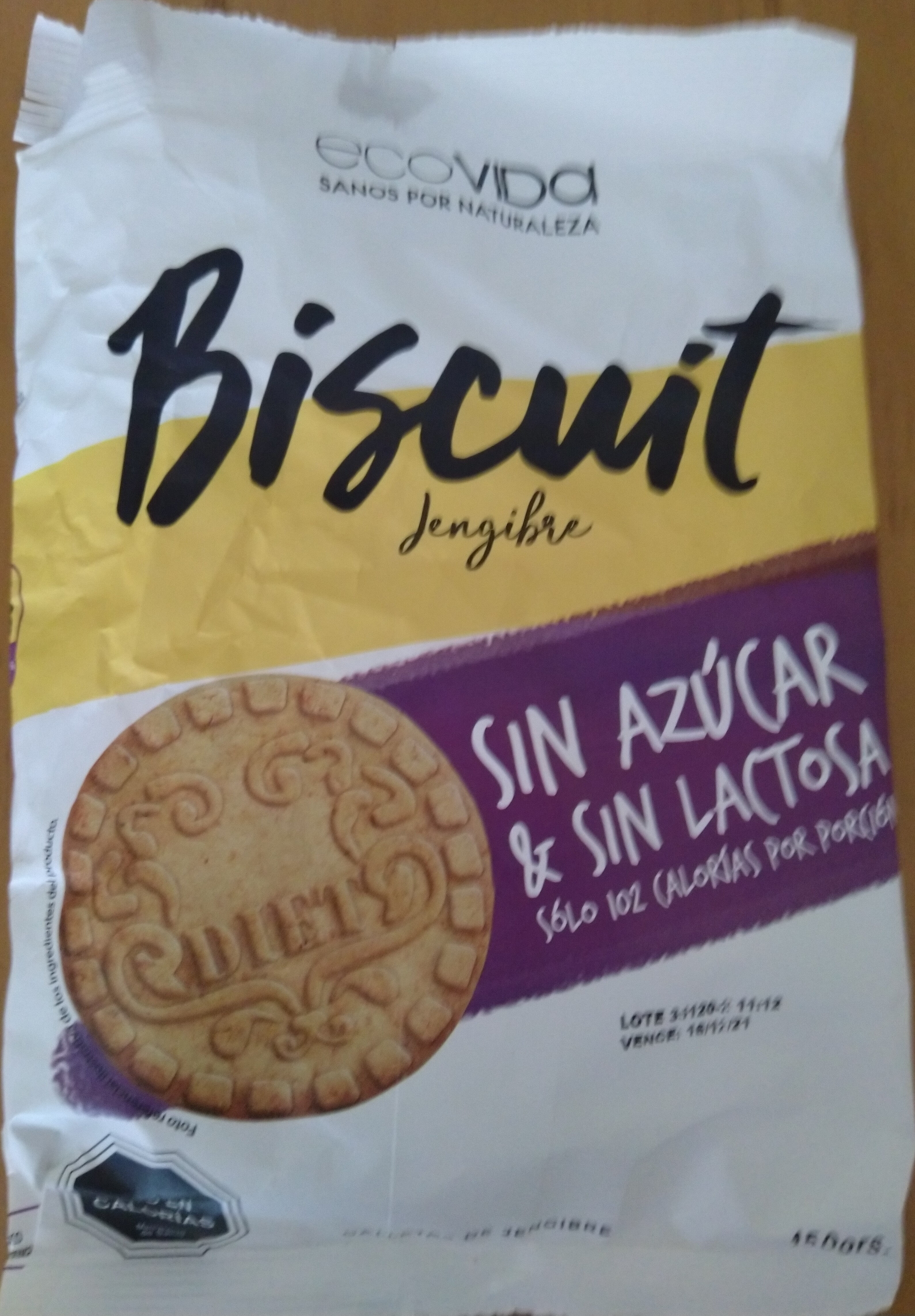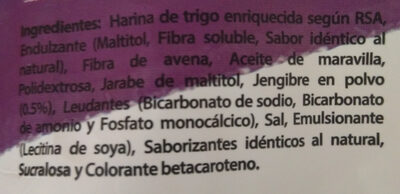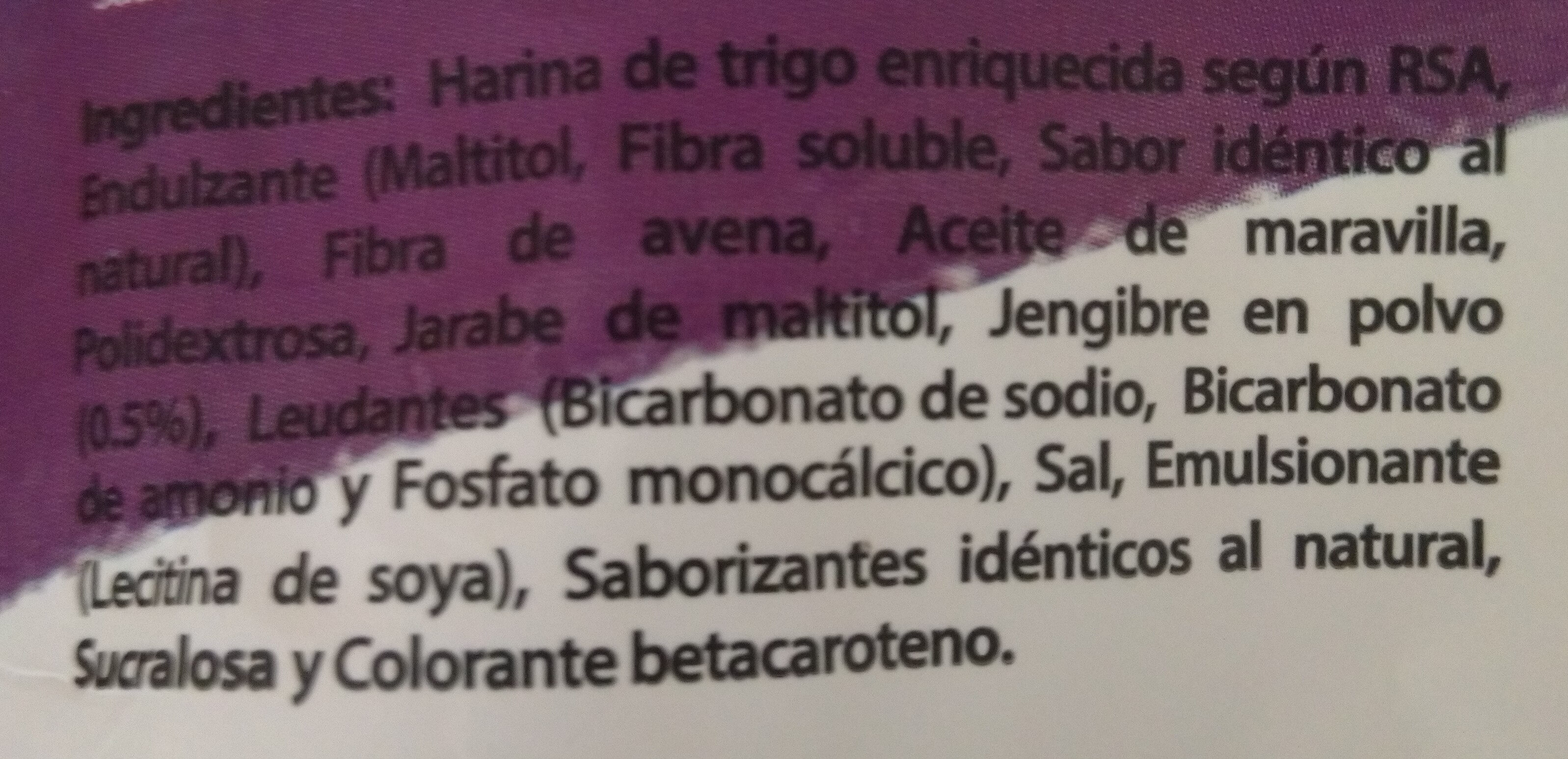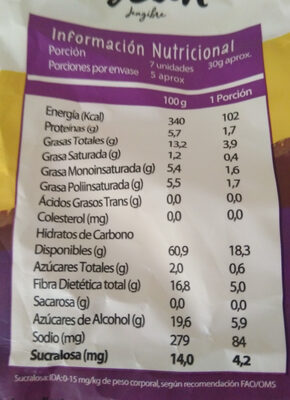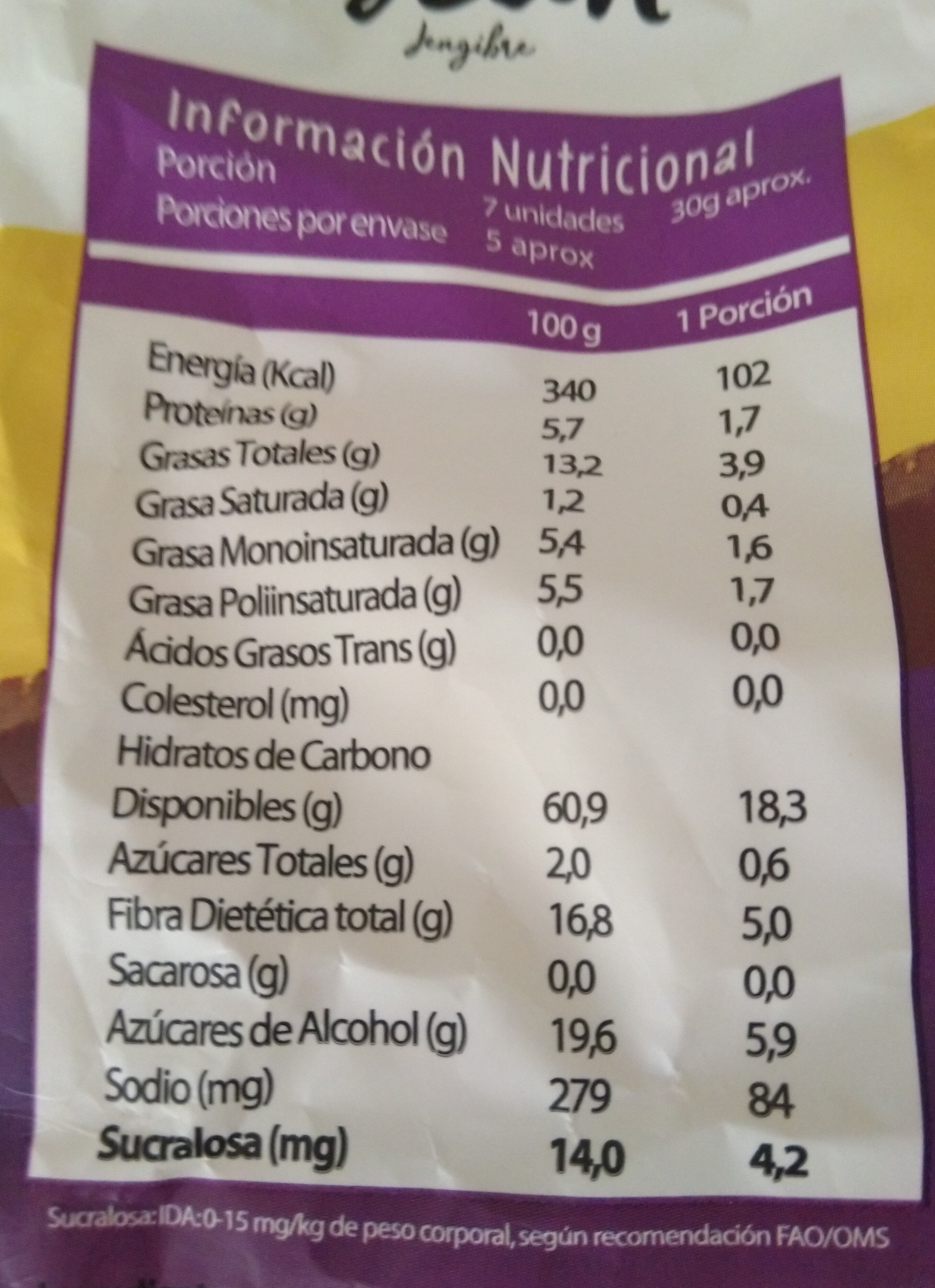Help us make food transparency the norm!
As a non-profit organization, we depend on your donations to continue informing consumers around the world about what they eat.
The food revolution starts with you!
Biscuit Jengibre - Ecovida - 150g
Biscuit Jengibre - Ecovida - 150g
This product page is not complete. You can help to complete it by editing it and adding more data from the photos we have, or by taking more photos using the app for Android or iPhone/iPad. Thank you!
×
Barcode: 7803520140309 (EAN / EAN-13)
Quantity: 150g
Brands: Ecovida
Categories: Snacks, Sweet snacks, Biscuits and cakes, Biscuits
Labels, certifications, awards: Low or no sugar, No lactose, No sugar
Countries where sold: Chile
Matching with your preferences
Health
Ingredients
-
20 ingredients
: Harina de trigo enriquecida según RSA, Endulzante (Maltitol, Fibra soluble, Sabor idéntico al natural), Fibra de avena, Aceite de maravilla, Polidextrosa, Jarabe de maltitol, Jengibre en polvo 0.5%, Leudantes (Bicarbonato de sodio, Bicarbonato de amonio y Fosfato monocálcico), Sal, Emulsionante (Lecitina de soya), Saborizantes idénticos al natural, Sucralosa y Colorante betacaroteno.Allergens: Soybeans
Food processing
-
Ultra processed foods
Elements that indicate the product is in the 4 - Ultra processed food and drink products group:
- Additive: E322 - Lecithins
- Additive: E955 - Sucralose
- Additive: E965 - Maltitol
- Ingredient: Emulsifier
- Ingredient: Sweetener
Food products are classified into 4 groups according to their degree of processing:
- Unprocessed or minimally processed foods
- Processed culinary ingredients
- Processed foods
- Ultra processed foods
The determination of the group is based on the category of the product and on the ingredients it contains.
Additives
-
E1200 - Polydextrose
Polydextrose: Polydextrose is a synthetic polymer of glucose. It is a food ingredient classified as soluble fiber by the U.S. Food and Drug Administration -FDA- as well as Health Canada, as of April 2013. It is frequently used to increase the dietary fiber content of food, to replace sugar, and to reduce calories and fat content. It is a multi-purpose food ingredient synthesized from dextrose -glucose-, plus about 10 percent sorbitol and 1 percent citric acid. Its E number is E1200. The FDA approved it in 1981. It is 0.1 times as sweet as sugar.Source: Wikipedia
-
E322 - Lecithins
Lecithins are natural compounds commonly used in the food industry as emulsifiers and stabilizers.
Extracted from sources like soybeans and eggs, lecithins consist of phospholipids that enhance the mixing of oil and water, ensuring smooth textures in various products like chocolates, dressings, and baked goods.
They do not present any known health risks.
-
E322i - Lecithin
Lecithins are natural compounds commonly used in the food industry as emulsifiers and stabilizers.
Extracted from sources like soybeans and eggs, lecithins consist of phospholipids that enhance the mixing of oil and water, ensuring smooth textures in various products like chocolates, dressings, and baked goods.
They do not present any known health risks.
-
E341 - Calcium phosphates
Calcium phosphate: Calcium phosphate is a family of materials and minerals containing calcium ions -Ca2+- together with inorganic phosphate anions. Some so-called calcium phosphates contain oxide and hydroxide as well. They are white solids of nutritious value.Source: Wikipedia
-
E341i - Monocalcium phosphate
Calcium phosphate: Calcium phosphate is a family of materials and minerals containing calcium ions -Ca2+- together with inorganic phosphate anions. Some so-called calcium phosphates contain oxide and hydroxide as well. They are white solids of nutritious value.Source: Wikipedia
-
E500 - Sodium carbonates
Sodium carbonates (E500) are compounds commonly used in food preparation as leavening agents, helping baked goods rise by releasing carbon dioxide when they interact with acids.
Often found in baking soda, they regulate the pH of food, preventing it from becoming too acidic or too alkaline. In the culinary world, sodium carbonates can also enhance the texture and structure of foods, such as noodles, by modifying the gluten network.
Generally recognized as safe, sodium carbonates are non-toxic when consumed in typical amounts found in food.
-
E500ii - Sodium hydrogen carbonate
Sodium hydrogen carbonate, also known as E500ii, is a food additive commonly used as a leavening agent.
When added to recipes, it releases carbon dioxide gas upon exposure to heat or acids, causing dough to rise and resulting in a light, fluffy texture in baked goods.
It is generally recognized as safe (GRAS) by regulatory authorities when used in appropriate quantities and poses no significant health risks when consumed in typical food applications.
-
E503 - Ammonium carbonates
Ammonium carbonate: Ammonium carbonate is a salt with the chemical formula -NH4-2CO3. Since it readily degrades to gaseous ammonia and carbon dioxide upon heating, it is used as a leavening agent and also as smelling salt. It is also known as baker's ammonia and was a predecessor to the more modern leavening agents baking soda and baking powder. It is a component of what was formerly known as sal volatile and salt of hartshorn.Source: Wikipedia
-
E503ii - Ammonium hydrogen carbonate
Ammonium carbonate: Ammonium carbonate is a salt with the chemical formula -NH4-2CO3. Since it readily degrades to gaseous ammonia and carbon dioxide upon heating, it is used as a leavening agent and also as smelling salt. It is also known as baker's ammonia and was a predecessor to the more modern leavening agents baking soda and baking powder. It is a component of what was formerly known as sal volatile and salt of hartshorn.Source: Wikipedia
-
E955 - Sucralose
Sucralose: Sucralose is an artificial sweetener and sugar substitute. The majority of ingested sucralose is not broken down by the body, so it is noncaloric. In the European Union, it is also known under the E number E955. It is produced by chlorination of sucrose. Sucralose is about 320 to 1‚000 times sweeter than sucrose, three times as sweet as both aspartame and acesulfame potassium, and twice as sweet as sodium saccharin. Evidence of benefit is lacking for long-term weight loss with some data supporting weight gain and heart disease risks.It is stable under heat and over a broad range of pH conditions. Therefore, it can be used in baking or in products that require a long shelf life. The commercial success of sucralose-based products stems from its favorable comparison to other low-calorie sweeteners in terms of taste, stability, and safety. Common brand names of sucralose-based sweeteners are Splenda, Zerocal, Sukrana, SucraPlus, Candys, Cukren, and Nevella. Canderel Yellow also contains sucralose, but the original Canderel and Green Canderel do not.Source: Wikipedia
-
E965 - Maltitol
Maltitol: Maltitol is a sugar alcohol -a polyol- used as a sugar substitute. It has 75–90% of the sweetness of sucrose -table sugar- and nearly identical properties, except for browning. It is used to replace table sugar because it is half as caloric, does not promote tooth decay, and has a somewhat lesser effect on blood glucose. In chemical terms, maltitol is known as 4-O-α-glucopyranosyl-D-sorbitol. It is used in commercial products under trade names such as Lesys, Maltisweet and SweetPearl.Source: Wikipedia
-
E965ii - Maltitol syrup
Maltitol: Maltitol is a sugar alcohol -a polyol- used as a sugar substitute. It has 75–90% of the sweetness of sucrose -table sugar- and nearly identical properties, except for browning. It is used to replace table sugar because it is half as caloric, does not promote tooth decay, and has a somewhat lesser effect on blood glucose. In chemical terms, maltitol is known as 4-O-α-glucopyranosyl-D-sorbitol. It is used in commercial products under trade names such as Lesys, Maltisweet and SweetPearl.Source: Wikipedia
Ingredients analysis
-
May contain palm oil
Ingredients that may contain palm oil: Beta-carotene dye
-
Vegan status unknown
Unrecognized ingredients: es:harina-de-trigo-enriquecida-segun-rsa, Soluble fibre, es:sabor-identico-al-natural, es:saborizantes-identicos-al-naturalSome ingredients could not be recognized.
We need your help!
You can help us recognize more ingredients and better analyze the list of ingredients for this product and others:
- Edit this product page to correct spelling mistakes in the ingredients list, and/or to remove ingredients in other languages and sentences that are not related to the ingredients.
- Add new entries, synonyms or translations to our multilingual lists of ingredients, ingredient processing methods, and labels.
If you would like to help, join the #ingredients channel on our Slack discussion space and/or learn about ingredients analysis on our wiki. Thank you!
-
Vegetarian status unknown
Unrecognized ingredients: es:harina-de-trigo-enriquecida-segun-rsa, Soluble fibre, es:sabor-identico-al-natural, es:saborizantes-identicos-al-naturalSome ingredients could not be recognized.
We need your help!
You can help us recognize more ingredients and better analyze the list of ingredients for this product and others:
- Edit this product page to correct spelling mistakes in the ingredients list, and/or to remove ingredients in other languages and sentences that are not related to the ingredients.
- Add new entries, synonyms or translations to our multilingual lists of ingredients, ingredient processing methods, and labels.
If you would like to help, join the #ingredients channel on our Slack discussion space and/or learn about ingredients analysis on our wiki. Thank you!
-
Details of the analysis of the ingredients
We need your help!
Some ingredients could not be recognized.
We need your help!
You can help us recognize more ingredients and better analyze the list of ingredients for this product and others:
- Edit this product page to correct spelling mistakes in the ingredients list, and/or to remove ingredients in other languages and sentences that are not related to the ingredients.
- Add new entries, synonyms or translations to our multilingual lists of ingredients, ingredient processing methods, and labels.
If you would like to help, join the #ingredients channel on our Slack discussion space and/or learn about ingredients analysis on our wiki. Thank you!
: Harina de trigo enriquecida según RSA, Endulzante (Maltitol, Fibra soluble, Sabor idéntico al natural), Fibra de avena, Aceite de maravilla, Polidextrosa, Jarabe de maltitol, Jengibre en polvo 0.5%, Leudantes (Bicarbonato de sodio, Bicarbonato de amonio, Fosfato monocálcico), Sal, Emulsionante (Lecitina de soya), Saborizantes idénticos al natural, Sucralosa, Colorante betacaroteno- Harina de trigo enriquecida según RSA -> es:harina-de-trigo-enriquecida-segun-rsa - percent_min: 7.69230769230769 - percent_max: 97
- Endulzante -> en:sweetener - percent_min: 0.5 - percent_max: 48.75
- Maltitol -> en:e965 - vegan: yes - vegetarian: yes - percent_min: 0.166666666666667 - percent_max: 48.75
- Fibra soluble -> en:soluble-fibre - percent_min: 0 - percent_max: 24.375
- Sabor idéntico al natural -> es:sabor-identico-al-natural - percent_min: 0 - percent_max: 16.25
- Fibra de avena -> en:oat-fibre - vegan: yes - vegetarian: yes - ciqual_food_code: 9310 - percent_min: 0.5 - percent_max: 32.6666666666667
- Aceite de maravilla -> en:sunflower-oil - vegan: yes - vegetarian: yes - from_palm_oil: no - ciqual_food_code: 17440 - percent_min: 0.5 - percent_max: 24.625
- Polidextrosa -> en:e1200 - vegan: yes - vegetarian: yes - percent_min: 0.5 - percent_max: 19.8
- Jarabe de maltitol -> en:e965ii - vegan: yes - vegetarian: yes - percent_min: 0.5 - percent_max: 16.5833333333333
- Jengibre en polvo -> en:ginger-powder - vegan: yes - vegetarian: yes - ciqual_food_code: 11006 - percent_min: 0.5 - percent: 0.5 - percent_max: 0.5
- Leudantes -> en:raising-agent - percent_min: 0 - percent_max: 0.5
- Bicarbonato de sodio -> en:e500ii - vegan: yes - vegetarian: yes - percent_min: 0 - percent_max: 0.5
- Bicarbonato de amonio -> en:e503ii - vegan: yes - vegetarian: yes - percent_min: 0 - percent_max: 0.25
- Fosfato monocálcico -> en:e341i - vegan: yes - vegetarian: yes - percent_min: 0 - percent_max: 0.166666666666667
- Sal -> en:salt - vegan: yes - vegetarian: yes - ciqual_food_code: 11058 - percent_min: 0 - percent_max: 0.00070866
- Emulsionante -> en:emulsifier - percent_min: 0 - percent_max: 0.00070866
- Lecitina de soya -> en:soya-lecithin - vegan: yes - vegetarian: yes - ciqual_food_code: 42200 - percent_min: 0 - percent_max: 0.00070866
- Saborizantes idénticos al natural -> es:saborizantes-identicos-al-natural - percent_min: 0 - percent_max: 0.00070866
- Sucralosa -> en:e955 - vegan: yes - vegetarian: yes - percent_min: 0 - percent_max: 0.00070866
- Colorante betacaroteno -> en:beta-carotene-dye - vegan: maybe - vegetarian: maybe - from_palm_oil: maybe - percent_min: 0 - percent_max: 0.00070866
Nutrition
-
Missing data to compute the Nutri-Score
Missing nutrition facts
⚠ ️The nutrition facts of the product must be specified in order to compute the Nutri-Score.Could you add the information needed to compute the Nutri-Score? Add nutrition facts
-
Nutrient levels
-
Fat in moderate quantity (13.2%)
What you need to know- A high consumption of fat, especially saturated fats, can raise cholesterol, which increases the risk of heart diseases.
Recommendation: Limit the consumption of fat and saturated fat- Choose products with lower fat and saturated fat content.
-
Sugars in low quantity (2%)
What you need to know- A high consumption of sugar can cause weight gain and tooth decay. It also augments the risk of type 2 diabetes and cardio-vascular diseases.
Recommendation: Limit the consumption of sugar and sugary drinks- Sugary drinks (such as sodas, fruit beverages, and fruit juices and nectars) should be limited as much as possible (no more than 1 glass a day).
- Choose products with lower sugar content and reduce the consumption of products with added sugars.
-
Salt in low quantity (0.000709%)
What you need to know- A high consumption of salt (or sodium) can cause raised blood pressure, which can increase the risk of heart disease and stroke.
- Many people who have high blood pressure do not know it, as there are often no symptoms.
- Most people consume too much salt (on average 9 to 12 grams per day), around twice the recommended maximum level of intake.
Recommendation: Limit the consumption of salt and salted food- Reduce the quantity of salt used when cooking, and don't salt again at the table.
- Limit the consumption of salty snacks and choose products with lower salt content.
-
-
Nutrition facts
Nutrition facts As sold
for 100 g / 100 mlAs sold
per serving (30g)Compared to: Biscuits Fat 13.2 g 3.96 g -34% Saturated fat ? ? Oleic acid 5.4 g 1.62 g -42% Carbohydrates 60.9 g 18.3 g -5% Sugars 2 g 0.6 g -93% Fiber 16.8 g 5.04 g +487% Proteins 5.7 g 1.71 g -8% Salt 0.001 g 0 g -100% Iron 19,600 mg 5,880 mg +841,102% Fruits‚ vegetables‚ nuts and rapeseed‚ walnut and olive oils (estimate from ingredients list analysis) 0 % 0 %
Environment
-
Eco-Score C - Moderate environmental impact
⚠ ️Select a country in order to include the full impact of transportation.The Eco-Score is an experimental score that summarizes the environmental impacts of food products.→ The Eco-Score was initially developped for France and it is being extended to other European countries. The Eco-Score formula is subject to change as it is regularly improved to make it more precise and better suited to each country.Life cycle analysis
-
Average impact of products of the same category: B (Score: 69/100)
Category: Biscuit (cookie)
Category: Biscuit (cookie)
- PEF environmental score: 0.35 (the lower the score, the lower the impact)
- including impact on climate change: 2.88 kg CO2 eq/kg of product
Stage Impact Agriculture
80.5 %Processing
11.8 %Packaging
3.1 %Transportation
3.2 %Distribution
1.4 %Consumption
0.0 %
Bonuses and maluses
-
Missing origins of ingredients information
Malus: -5
⚠ ️ The origins of the ingredients of this product are not indicated.
If they are indicated on the packaging, you can modify the product sheet and add them.
If you are the manufacturer of this product, you can send us the information with our free platform for producers.
-
Missing packaging information for this product
Malus: -15
⚠ ️ The information about the packaging of this product is not filled in.⚠ ️ For a more precise calculation of the Eco-Score, you can modify the product page and add them.
If you are the manufacturer of this product, you can send us the information with our free platform for producers.
Eco-Score for this product
-
Impact for this product: C (Score: 49/100)
Product: Biscuit Jengibre - Ecovida - 150g
Life cycle analysis score: 69
Sum of bonuses and maluses: -20
Final score: 49/100
-
Carbon footprint
-
Equal to driving 1.5 km in a petrol car
288 g CO² per 100g of product
The carbon emission figure comes from ADEME's Agribalyse database, for the category: Biscuit (cookie) (Source: ADEME Agribalyse Database)
Stage Impact Agriculture
82.9 %Processing
7.9 %Packaging
3.8 %Transportation
4.7 %Distribution
0.7 %Consumption
0.0 %
Packaging
-
Missing packaging information for this product
⚠ ️ The information about the packaging of this product is not filled in.Take a photo of the recycling information Take a photo of the recycling information
Transportation
-
Origins of ingredients
Missing origins of ingredients information
⚠ ️ The origins of the ingredients of this product are not indicated.
If they are indicated on the packaging, you can modify the product sheet and add them.
If you are the manufacturer of this product, you can send us the information with our free platform for producers.Add the origins of ingredients for this product Add the origins of ingredients for this product
Report a problem
-
Incomplete or incorrect information?
Category, labels, ingredients, allergens, nutritional information, photos etc.
If the information does not match the information on the packaging, please complete or correct it. Open Food Facts is a collaborative database, and every contribution is useful for all.
Data sources
Product added on by ultimute
Last edit of product page on by roboto-app.
Product page also edited by openfoodfacts-contributors.
